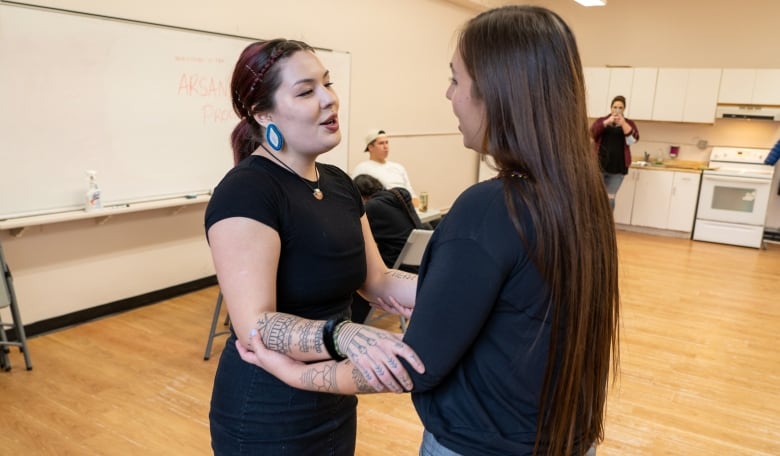
TAMPA, Fla. — Hockey jerseys hang from the bedroom wall, hovering above the Lightning puck resting on a nearby desk.
The sport is one of Jo Brazinski’s passions, along with Big Time Rush, a pop band that once starred in a Nickelodeon TV series about four hockey players.
“I don’t play hockey, but I’m trying to,” Brazinski said, holding back tears. “One of the hardest things is I can’t find a team where I’m comfortable enough to be out.”
The 14-year-old from Tampa hasn’t told people they’re queer. “People just know. It kind of just comes with me,” they said. But in the hockey community, Brazinski doesn’t feel accepted.
“It just sucks so much. … I didn’t do anything. I’m just living.”
Sports have long been a fraught topic for transgender and nonbinary youth, many of whom say they’ve felt isolated on teams, sometimes avoiding them altogether. Then came the 2021 session of the Florida Legislature, and last week’s 77-40 vote by the Florida House to ban transgender athletes from participating in women’s and girls scholastic sports.
The legislation died Tuesday in the Senate, its sponsor, state Sen. Kelli Stargel, R-Lakeland, saying the chamber likely will not have time to address it this year. But she also suggested it could surface again in 2022.
For transgender youth, the session has given rise to fears of another political assault on their place in society. They are reminded of efforts in recent years to dictate rules for how transgender people can use public restrooms. And with parents and advocates joining in, they speak of lawmakers working to “legislate away” their identity.
For the youngest, those uneasy feelings come amid the emotional turbulence of puberty. And the fact that lawmakers have targeted the world of sports adds anxiety.
“A lot of trans people, including myself, don’t really feel comfortable in sports,” said Bea, a St. Petersburg 14-year-old whose family requested that their last name not be used for safety and privacy reasons.
“Sports are already scary,” Bea said, “and there are a lot of trans people who aren’t in sports because of how transphobic they are.”
Recently, a child named Elias came home asking if some people think they shouldn’t be on sports teams just because they’re nonbinary. At 7 years old, Elias has already been a target of bullying for being transgender.
“The stakes are whether or not children from early ages feel like they belong in our society,” said Adam Gray, Elias’ father and lead pastor at Circle of Faith, a progressive ministry in St. Petersburg. As a parent, he said, “it’s anxiety inducing.”
From an early age, Elias expressed that they didn’t feel comfortable in a male body. They wanted to wear dresses and paint their nails. “As affirming parents, we’ve put this community of love, acceptance and curiosity around Elias,” the father said.
That community includes pediatricians, mental health counselors, faith organizations and a soccer league where boys and girls play together.
But those safe spaces are being eroded by the legislation similar to Florida’s that is sweeping through more than 30 states, families say.
Last week’s vote on HB 1475 prompted Andrew Adams, 20, to reflect on his experience as a 10-year-old who fell in love with Brazilian Jiu-Jitsu.
Back then, Adams, who’s transgender, competed as male and “it was never an issue,” he said. “Gender has never mattered on the mat.”
The current political debate is hard to stomach, he said. “It’s heartbreaking. I know what it feels like to watch my life literally be legislated away.”
Adams spent his high school years fighting for transgender students to have access to restrooms that match their gender identity with the help of Lambda Legal, a nonprofit LGBTQ civil rights organization. Last summer, a federal appellate court ruled in his favor, allowing students equal access.
Sasha Buchert, a lawyer with Lambda Legal who is transgender, says bills like HB 1475 lead to more emotional trauma in a community already facing high suicide rates. “It’s life-lasting harm,” she said.
“Trans girls are girls and they’re included under Title IX,” Buchert said, referring to the federal civil rights law that prohibits sex-based discrimination in schools.
The legislation “didn’t work with bathrooms,” Buchert said, “and it’s not going to work with sports.”
Although transgender students represent a small portion of athletes, debates like the one in Florida affect youth around the country, whether or not they play sports, teens say.
Tobias Deggans, 16, has avoided school sports teams for many reasons, including not wanting to be misgendered or engage in debates about which changing room he can use.
Because it’s been nearly five years since he came out, “I’ve learned to kind of separate my sense of self from how people perceive me,” Deggans said. His love for music translates into a collection of Spotify playlists that match his every mood and a spot in the Music Honors Society at school.
Deggans says he has friends who are starting hormones soon and struggles with how angry he is about all that comes with living at the intersections of multiple marginalized identities.
“I’m not white, I’m queer, I’m trans,” said Deggans, who’s a board member on Gibbs High School’s Gay Straight Alliance. “It just kind of sucks to always be the subject of the debate.”
In the 2020 National Survey on LGBTQ Youth Mental Health conducted by The Trevor Project, more than 85 percent of the over 40,000 LGBTQ youth respondents aged 13 to 24 reported that recent politics have negatively impacted their well-being.
And data from Trans LifeLine — a trans peer support and crisis hotline — demonstrates the mental health impact of introducing public policy that may negatively impact the community.
In October of 2018, after the Trump administration announced a directive to roll back protections for trans people, the number of calls to the hotline during that week were three times as high as previous weeks. And in 2020, as three news stories targeting the transgender community broke in the same week, the hotline saw four times their typical call volume.
“It feels like a never-ending onslaught of attacks,” said Ashley Mayfaire, co-founder of TransSocial Inc., a South Florida-based organization promoting unity within the LGBTQ community. “It seems like (lawmakers) are trying to eradicate transgender people from public life.”
More than 3 in 4 transgender and nonbinary youth reported symptoms of generalized anxiety disorder in the two weeks prior to The Trevor Project survey. And over half of the transgender and nonbinary youth respondents indicated they had seriously considered taking their own life. Just over 30 percent of their cisgender LGBTQ peers — those whose gender identity matches the one assigned at birth — reported the same.
And more than 1 in 5 of the transgender and nonbinary respondents had attempted suicide in the year prior to the survey.
Still, supportive environments have a significant impact. Transgender and nonbinary youth who said their pronouns were respected by all or most people in their lives attempted suicide at half the rate of those who did not.
“I’m afraid,” said Karleigh Webb, a 49-year-old Black transgender woman and call operator for Trans LifeLine. “So imagine what it would be like if you’re say a young, 11-year-old trans boy at a school in Tampa.”
Legislation like HB 1475 chips away at trans people’s psyche, said Webb. “Being a teenager is hard as it is,” she said. “Having to go through it when you don’t feel right in your own body and not just because puberty’s weird but because you really feel that something’s out of whack… it’s going to affect you.”
Parents and advocates say that losing a sense of belonging from a young age has life-long impacts.
Legislation like HB 1475 puts a target on the backs of transgender youth, said Brandon Wolf, a spokesperson for Equality Florida and a survivor of the Pulse nightclub shooting. “It also means that they’re forced into advocating for their own existence.”
In response, Equality Florida is hosting a mental health space for advocates who have come forward to testify in front of lawmakers.
Wolf said advocates have remarked “how much more emotionally taxing it is than they thought it would be to stand in front of legislators and get at most 60 seconds to share why their lived experience is valid.” It’s particularly difficult when they’re in the same room as legislators using transphobic terms, Wolf said.
And stacking on top of the microaggressions and discrimination transgender people face, national data shows LGBTQ people are far more likely to be victims of crime.
“It’s hard to feel empowered when you also feel like if you make your voice heard, you’re going to be further victimized,” said Mayfaire, the TransSocial co-founder.
For young people, advocating for their needs within their communities can be an immense feat.
A lot of the time Bea, the St. Petersburg middle-schooler, lets people misgender them because it’s “annoying” and also “kind of scary” to correct others, they said.
“I feel like people see my gender before they see my personality. Being nonbinary is important to me but it’s not all of me,” Bea said. People “don’t even try to see me as nonbinary most of the time. They just see me as a girl who likes to be called ‘they.’”
Bea has found community through organizations like Metro Inclusive Health, online groups, and within books. When they were younger, they’d take note of the rare stories where LGBTQ characters were brought to life. And whenever they were feeling down, they’d fold open a cover and read over a few sentences.
Now, Bea knows many people who weren’t out before but are today, they said.
“I was never alone.”
———
(The Foundation for a Healthy St. Petersburg provides partial funding for Times stories on equity. It does not select story topics and is not involved in the reporting or editing.)
©2021 Tampa Bay Times. Visit at tampabay.com. Distributed by Tribune Content Agency, LLC.







